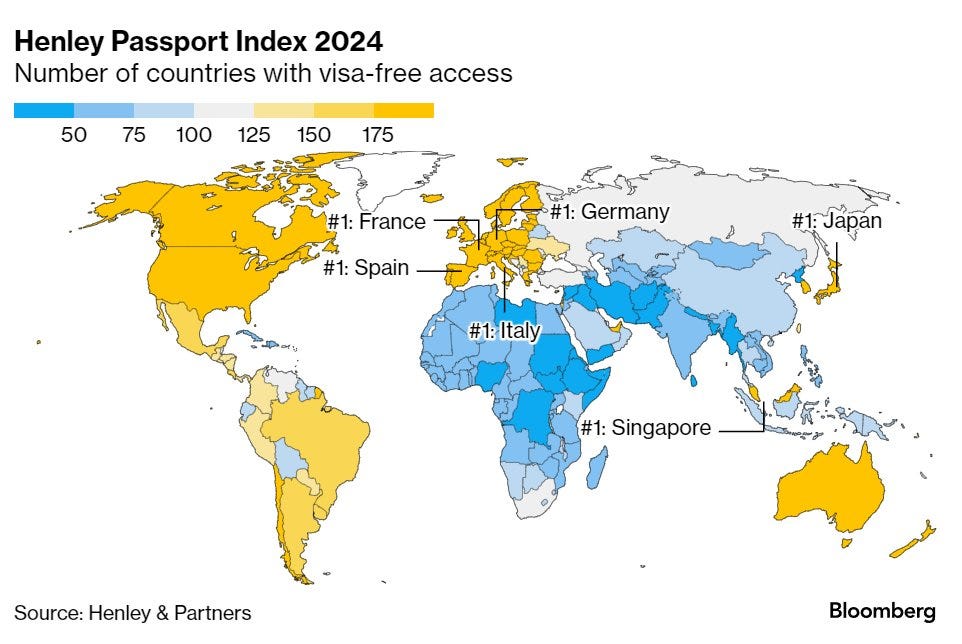Wanna go to Paris for the weekend?
Some of us can't jet-set-go wherever we want on a whim (and that's not the only issue, obvs).
“It’s a scam! They say it’s 10 years, but really, it’s only valid for 9 & a half years!!”
A lady exclaims about her passport on a long-since-lost Instagram reel on my feed. She’s just discovered that you cannot travel on a passport expiring within 6 months.
She’s a seasoned traveller, so her ignorance is probably because she’s really never needed her passport to travel to many places — her citizenship card/simply showing her passport (even if it’s expired) has worked in the past.
Visaguide states, “The six-month rule in Canada may change depending on your country of origin — check with an embassy before travelling.” Some other countries offer a 3-month validity option if you hold a particular country’s passport over others.
The comments weren’t kind to her. People from several different countries tore her apart for not knowing such a basic fact — how can you not know when your passport expires and that you need to renew it at least a year before? Have you never applied for a visa before?
Probably not.
She has one of those ultra-strong passports that allow you to pack up and book a last-minute flight to enter another ‘first-world’ country.
Passport privilege1 isn’t a thing that occurs to most of us — unless, of course, you don’t have it.
How does your passport affect your income (or lack of it)?
It’s not just recreational travelling that’s affected by citizenship (or which passports you hold). It goes deeper than that.
60% of someone’s income is determined by where they live/were born.
Branko Milanović, one of the world’s leading economists on social inequality, says:
“[A] generally larger part of [influence on income distribution] comes from being born in a given country. Rich countries provide what may be called “citizenship or location premium”, poor countries, “citizenship or location penalty.”
To put it simply (and also a bit obviously), if you’re born in a rich country, you’ll earn more than someone born in a poorer country. Your drive, effort, and talent has nothing to do with that. Unless a country offers stupendous intergenerational mobility, the cycle mostly continues.
“[Someone’s] family background and person’s place of birth, allows us to explain more than 80 percent of [their] long-term income. The place of birth – or, more exactly, citizenship – is “fate” unless the person is able to move to a different country. The poorest Americans for example are better off than more than two-thirds of the world population.
“We could continue for a long time to give examples that show the importance of this factor. Only 5 percent of Cameroonians for example have a higher income than the poorest Germans. One’s income thus crucially depends on citizenship, which in turn means – in a world of rather low international migration – place of birth.”
We’ve known this for a while. There’s a lot of discourse on companies in the US/UK/any Western country that’s sufficiently developed ‘outsourcing’ their labour to India, the Philippines, etc., where the currency is lower — allowing them to get ‘more bang for their buck.’ There are two sides to the discussion: it’s a form of underpayment, but also, that country’s currency/market rate decides how much a majority of the folks get paid2.
“[ ]…most of a person’s lifetime income is determined by where he or she lives or were born (less than 4 per cent of the world’s population live in countries they were not born in). The incomes of two individuals identical in all respects except that one was born in a rich country and the other in a poor one might differ by a factor of 10 or 20, or even more.” — Financial Times
Okay, so why don’t you move? (We can’t, not easily)
Aside from lifelong income, your citizenship/passport/where you live (even currently) affects which work opportunities you can get or even apply for.
“LinkedIn’s default settings automatically filter out applicants based on certain criteria, such as location.” - Jerry Lee (Wonsulting)
So, I could be sitting in Mumbai, applying for a job in Germany, fulfilling all the criteria needed for the role—and they might even be open to international applicants—but the actual job-seeking site itself won’t let my profile pass. Not a fun fact to learn in this awful job market.
Twice in five years, I’ve held work permits for two different countries and shed a lot of blood, sweat, tears, and money to get those. Both times, they’ve been taken away without any fault of mine — a story that’s incredibly common for immigrants who leave home to seek better opportunities. And don’t get me wrong; I’m very aware of the privilege that afforded me the chance to try for these work permits in the first place.
However, that privilege doesn’t go very far abroad because my passport still determines many things. Whether it’s being called an expat (someone from a wealthy, mostly-white nation enjoying a few years abroad, expanding their horizons) or an immigrant (someone who’s here to steal all our jobs!!), it trickles down to so many things.
“Often the former is used to describe educated, rich professionals working abroad, while those in less privileged positions — for example, a maid in the Gulf states or a construction worker in Asia — are deemed foreign workers or migrant workers. The classification matters, because such language can in some cases be used as a political tool or to dehumanise — as the debate around the word “migrant” suggests.”
Even for the fairly privileged in the location-penalty country, their passport/citizenship can be problematic. Unless you’re filthy rich and can afford to throw away money blindly, you’ll find yourself toting a bag full of documents (unwillingly contributing to paper waste) to apply for a Schengen or US visa. You can have every single document, but perhaps not a photocopy of one important one, and boom, visa rejected.
Or, if you’re lucky, granted, for a very specific time — 30 days, in and out, and don’t you dare overstay, or you’ll be banned. This doesn’t apply if you’re someone visiting a developing country on an e-visa/visa on entry/no visa requirement — you could just pay a fine or a bribe and stick around to enjoy working remotely on beaches, sipping iced tea, which costs 1/10th of the cost back home!
The concept of a digital nomad fascinates me because it does not apply to many people in the Global South or to any country not in the top 20 of the global passport power index. I can work from anywhere—until I have a visa, of course.

It’s fascinating because, for several decades, certain countries have enjoyed their passport privileges. But recently, due to Brexit, developing countries rethinking their entry requirements, and just, a general done-ness, folks from the UK & US are realising it’s not that easy to ‘travel’ after all.
Personally, I’m a huge fan of this. I think reciprocity is vital in international relations. 😊
If I need to bend over backwards to get a visa to visit your country, it would be nice if you had to do the same. Of course, some countries seemingly hold more appeal—for a better life, more money (see above for location premiums/penalties), safety, etc. But it’s not long ago that some of these countries overstayed their welcome in our then-thriving countries.
“India’s share of the world economy when Britain arrived on its shores was 23%, by the time the British left it was down to below 4%. Why? Simply because India had been governed for the benefit of Britain.” — Dr Shashi Tharoor MP - Britain Does Owe Reparations
And yet, I will happily bet that it’s much easier for a person with a UK passport to enter India than it is for any Indian to enter the UK or any (ex?) coloniser country who once freely moved around the world.
I’m particularly conscious of how deeply entrenched passport privilege runs as I sit across the world while my loved ones who live in a different country need me, but I can’t visit them because I don’t have a visa for that country. What a pity, indeed.
What did you think of this issue?
Your anonymous feedback helps me improve. Thanks!
If you liked this issue (or the newsletter in general), feel free to buy me a coffee or two!
From my open tabs to yours! ✨
Been getting back into reading (books & articles both), so we've got more stuff for you to read today:
A somewhat comprehensive list of everything related to books that I've published on this newsletter. From exploring why reading fiction is good for you, the dangers of elitism in reading, and my favourite books (circa 2021, needs to be updated), here's A World Book Day Roundup of Bookish Posts on Not Controversial 📚
On being a good girl, doing everything right, and by the book, and for others, and still getting fucked over because nice doesn't mean that people respect you. Loved this post on
by .- on ex-beloved children's book author JK Rowling and her frankly ridiculous and bigoted TERFy views
A cocoa farmer tasting chocolate for the first time. Simultaneously both sweet & sad because they work so hard and yet haven't had the 'privilege' of tasting chocolate, something most of us take for granted.
A lil’ World Book Day 📚 post on Instagram:
Thanks for reading! Please hit the heart below or drop a comment if you liked it (helps more people find this newsletter + gives me a serotonin boost). 🖤
Listing ‘travelling’ on your CV, followed by a long list of countries you’ve visited, is such a privilege, and it’s unattainable for many people around the world.
Of course, companies will always try to pay below market rate; that’s just how it goes. Always ask for more money at work when you can.







I think about this all the time. Particularly the language used around all of this moving around. I called myself an 'expat' (living in countries with a specific very privileged visa only because of job that my husband had) until just over a year ago. Now I call myself an immigrant. Again with incredible privilege. Today, one year+ into the process, the police came to verify that I actually did live at the address that is on all of the (paper) forms I have filled out. Thank you for the article about the words and power and stigma around the phrase migrant worker. We took all of these opportunities outside of our home country for economic and family reasons and we have decided to stay in the final country. The process has certainly been easier (but not swifter) because of the passport we hold. The words I use should be the same too.
The amount of bullshit I had to navigate to move from South Africa to the UK despite the fact that my own mother was a Scottish passport holder 🫠
It’s like they only wanted to be colonising and not colonised themselves